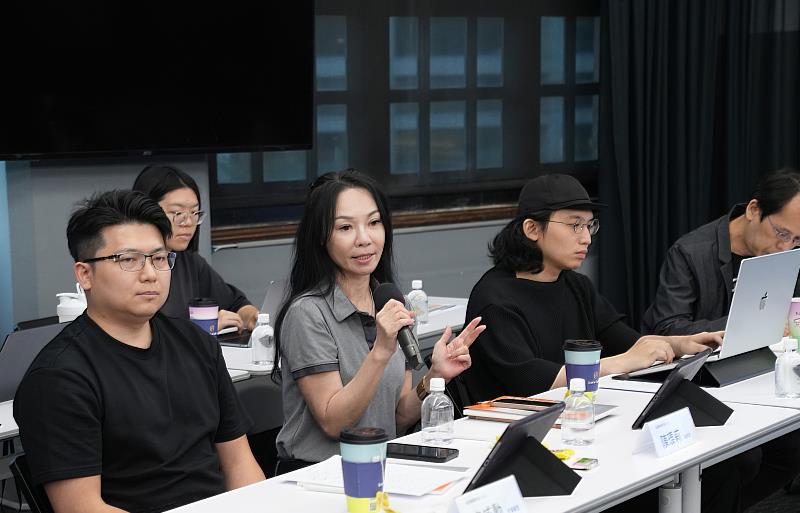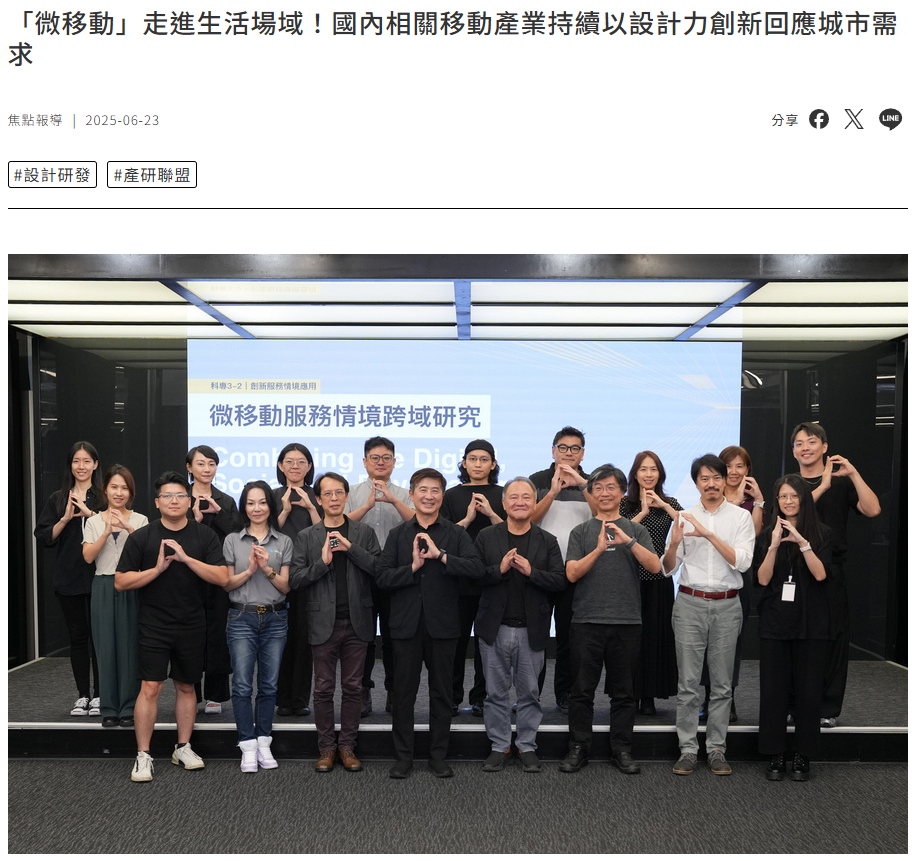About
Micromobility Enters Everyday Spaces! Mobility Industry of Taiwan Continues to Innovate Through Design to Meet Urban Needs

2025 / 06 / 23

Taiwan Design Research Institute Advances Micromobility Development in Its Third Year: Driving Innovation Through Cross-Sector Collaboration and Design Application
Now in its third year of promoting micromobility, the Taiwan Design Research Institute (TDRI), together with members of the Micromobility Industry-Academia Alliance, hosted the Micromobility Industry Innovation Trends Application Forum – Midterm Industry-Academia Exchange on June 18. The event continues efforts to develop resilient micromobility systems, support industrial applications, and adapt to environmental contexts. This year’s focus is on two major application scenarios: Elderly Care Services and Tourism Value-Added Applications, combining research and design development resources while actively fostering cross-disciplinary collaboration to identify locally suitable and innovative applications.
Cross-Disciplinary Experts Share Insights on “Elderly Service Construction”
As Taiwan becomes a super-aged society, urban mobility has become a key issue. For elderly users, along with the agencies and industries providing mobility services, not only safety but also convenience and independence have emerged as crucial needs. Addressing the gap between diverse mobility scenarios and local service demands, TDRI invited the Taiwan Service Science Society and Ming-Tien Design to form a preliminary research team focused on “Elderly Service Construction,” exploring how micromobility can meet the evolving demands of an aging population.
Dr. Hung-Chih Lai, Strategy Director of the NTU Smart Living Center, emphasized that policy support is essential to the practical implementation of micromobility solutions. He noted that product development must prioritize service redesign—not necessarily full digitalization—but rather user-friendly technologies and viable business models. Prof. Mandy Wang of Soochow University’s Psychology Department shared real-world findings, observing that changes in the environment and daily routines significantly affect seniors’ willingness to adopt micromobility services. Maintaining motivation and purpose in daily life is vital.
Prof. Li-Fan Liu of National Cheng Kung University’s Institute of Gerontology offered a perspective from aging studies: if we examine mobility through the lens of the environment, the focus is on human agency and adaptive capacity; from a human-centered view, greater environmental support can reduce the need for constant adaptation.
Tourism Application Innovation: Creating Culturally Rich and Immersive Experiences
With shifts in regional revitalization and travel behavior, tourism experiences are evolving from simple consumer activities into journeys rich in interaction, emotional connection, and cultural depth. Today’s tourists value not just convenient mobility, but also cultural engagement and local connection. TDRI invited Taiwan Tech’s Department of Design and Fun-Mate Innovation Lab to form a team dedicated to “Tourism Value-Added Applications.” The initiative connects with the electric-assist bicycle (E-Bike) industry to create new opportunities for diversified micromobility experiences and commercial applications rooted in local tourism assets.
Assistant Professor Ling Tian of NYCU’s Graduate Institute of Architecture explained that integrating smart devices with bicycles—offering navigation and activity recognition—can create personalized mobility experiences. These systems not only demonstrate IoT logic but also serve as mediums for cultural exchange and spatial exploration. Associate Professor Hou Chun-Hao, also of NYCU, extended the conversation to human-centered design, emphasizing the role of sensory and psychological expectations in how people interact with environments. He illustrated this by noting how even a concert held 500 kilometers away could foster immersive tourism through audio connections that bridge physical and emotional distances.
Dr. Shih-Nan Liu, Director of R&D at TDRI, cited Thomas Heatherwick’s book Humanise in asserting that design should respond to both human needs and environmental subtleties. He emphasized that micromobility is not just a technological evolution, but also a cultural reflection. Taiwan Tech’s research team conducted environmental analysis, which, combined with Fun-Mate Innovation Lab’s expertise in user experience, led to integrated strategies for applying micromobility design in tourism.
Aura Sustainable Smart Technologies CEO Lily Chen noted, “Carbon reduction and energy efficiency are evolving from slogans to real spatial practices in cities and rural areas. Aura aims to serve as a bridge connecting urban and rural stories.” OKGO’s Marketing Director, Will Lee, added, “Our future focus is on site-specific applications and commercial business models, creating differentiated micromobility tourism experiences.”
Looking Ahead: Expanding the Impact of Design in Micromobility
TDRI President Chi-Yi Chang envisions design playing a frontline role in R&D, just like technology, while also ensuring practical implementation. Through collaborative innovation platforms combining industry, academia, and research, he aims to broaden participation and deepen the impact of micromobility development in Taiwan. R&D Director Liu Shih-Nan further referenced Don Norman’s concept of human-centered interaction design, noting that product or technology applications must be viewed in tandem with the kind of future life we envision—they are inseparable.
TDRI has already launched a design research and prototype development project focused on tourism-enhancing micromobility applications. Moving forward, the institute will continue to integrate interdisciplinary insights, engage in site negotiations, and conduct real-world testing to evaluate how interaction design can enrich user experience and expand the possibilities for immersive and innovative micromobility services in the future.

台灣設計研究院推動微移動議題已邁入第三年,設研院攜手微移動產研聯盟成員於6月18日,透過「微移動產業創新趨勢應用研討會-期中產研交流」持續佈局微移動的韌性發展、產業應用及環境適應。今年聚焦「高齡服務建構」與「觀光加值應用」兩大應用情境,分別整合應用研究與設計開發的設計資源,並積極與產研聯盟成員進行跨域協作,尋求適合地方與特性的應用創新的機會。
此次研討會邀請跨領域專家、跨學科的學研單位與產研聯盟夥伴進行研發成果交流,從專注使用者需求與場域脈絡出發,重視高齡應用的使用行為需求,與觀光產業服務發展的契機,並透過產業協作,佈局AIGC等前瞻技術應用、創新服務模式開發及國內政策支援的應用實踐。
以跨域學者和專家視角,分享「高齡服務建構」的應用情境觀點
城市的移動性在已邁入超高齡社會的台灣,逐漸發展成重要的城市發展議題。高齡使用者與提供高齡服務的管理單位與產業,除了面對移動安全的基本條件外,未來生活的便利性與高齡者的自主性,已成為高齡移動性在城市發展視角的重要命題。因應用多元移動情境的事實與在地服務需求的缺口,台灣設計研究院邀請台灣服務科學學會與鳴天設計籌組以「高齡服務建構」為目標的前期探索研究團隊,持續推動「微移動」延伸回應超高齡社會的趨勢發展。
台大智活中心賴宏誌策略長認為未來微移動的解法需要注意政策的推動,因為相關政策的支持會影響實際應用實踐的重要性。在多元的使用者的多樣需求下,產品需要的是服務的再設計不一定是數位化,而是好用的科技接下來則是商業模式的建構。東吳大學心理學系汪曼穎教授實際案例觀察到,環境與生活脈絡的變化會直接影響長者對微移動服務的選擇意願,如何維持日常生活動機和目標至關重要。成功大學老年學研究所劉立凡教授以老齡學的視角提出:在人與環境互動中,如果從環境的角度去看,會強調人的能動性與創新適應力;但如果從人的角度去看,若能得到更多來自環境的支持,人則不一定要創新適應。
以跨域學者和產研聯盟夥伴視角,分享「觀光加值應用」的情境觀點
隨著地方創生與旅遊型態的轉變,觀光體驗已從單一場景的消費活動,轉向互動性、情感連結與文化深度的體驗旅程。觀光族群重視的不僅是移動的便利,更關注參與過程中的在地連結與文化感知。如何整合科技、文化與場域特性,打造具差異化的體驗,成為微移動應用發展的關鍵視角。台灣設計研究院邀請台灣科技大學設計系與玩味創研籌組以「觀光應用加值」為目標的應用探索與服務創新團隊,並媒合電動輔助自行車產業合作,整合觀光場域與地方特色,拓展多元移動體驗與商業應用的機會。
陽明交大建築研究所凌天助理教授指出,當將腳踏車系統結合智慧裝置,並具備導覽與活動識別等功能時,便能發展為個人化的導航服務,不僅展現IoT的系統邏輯更成為文化傳遞與場域探索的重要媒介。陽明交大建築研究所侯君昊副教授延續人本設計的思維,指出感官與心理預期在人與場域互動中扮演關鍵角色。他進一步說明,即便是一場相距五百公里的音樂會,也能透過城市聲音的擴散,串聯現場與遠方的情感連結,形塑跨越距離的沉浸式觀光體驗。
台灣設計研究院劉世南研發長引述建築師海澤維克(Heatherwick)新書《人本建築》中的觀點,指出設計應回應人性與環境的細緻關懷。他認為微移動不僅是技術的升級,更是文化層次的延伸與反思。台科大的研究團隊對環境情況進行分析,結合玩味創研對微移動體驗的深入探索,兩者共同構築相輔相成的應用策略。永續智能科技(Aura) 陳瑮莉總經理表示:「節能減碳從口號走向城市與鄉鎮的具體空間實踐,Aura期望成為串聯城鄉故事的載體。」凱智綠能科技(OKGO)市場總監李威勳指出:「未來將聚焦場域應用與商業模式應用,打造具差異化的微移動觀光體驗。」
台灣設計研究院張基義院長期待設計如同科技能擔任研發的前端角色,同時具備應用實踐的能力。透過產學研平台的共創能吸引多方參與,實質影響台灣微移動產業的發展。台灣設計研究院劉世南研發長提及Don Norman以人為中心的互動設計概念,從產業產品或技術的應用看未來,從我們所想要的生活來看,兩者是分不開的。今年設研院已啟動微移動觀光應用加值的設計研究與原型開發,接下來將持續透過跨域產研協作整合洞察,並進行場域洽談與實際落地測試,檢視互動設計能否為微移動使用者帶來擴增旅程目的的沈浸體驗,以提升能拓展未來移動情境的創新應用服務機會。
View full article:












